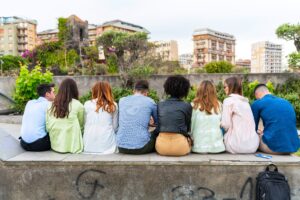Students Organising for Sustainability (SOS UK) – working to create an inclusive environment


As part of the Diverse Sustainability’s Best Practice series, SOS-UK provided a session around some of their own learnings during their recruitment stage, this is a write-up of the session they provided. This write-up will explore their journey into a more diverse workplace and some inclusive practices that they embedded. Please note that this aims to share different learnings from our partner organisations as opposed to advising right from wrong.
Meg Baker (she/her) Co-director of Inclusion and Climate Justice at Students Organising for Sustainability (SOS-UK) ‘In 2018 we had just two people of colour, out of 16 staff. By creating an inclusive working culture, taking an intersectional approach, and through positive action, 35% of our staff team are now people of colour, as are 40% of our Board.’
Some of the internal/ external work SOS UK are doing:
Race for nature:
The UK environmental sector is made up of less than 5% of people from ethic minorities, and is one of the least racially diverse sectors in the country. This is a real problem, because it is black and brown communities around the world that are suffering the most from the climate emergency and ecological crisis. As we go into what might be our last stand for climate and nature, it is essential that the organisations leading this fight represent the communities they serve and protect.
The programme partnered with over 30 UK nature environmental organisations, engaged over 125 young people aged 16-24, 71% from under-represented backgrounds. SOS UK took on 6 kickstarters, two of which went onto other employment and 4 on fixed term project coordinator roles.
Focus groups feedback
In October 2022, two online focus groups were held with 14 young people in the early stages of their careers in the environment sector. The 90-minute text-based focus groups, facilitated by staff from SOS-UK and Action for Conservation and funded by the Esmee Fairbairn Foundation included discussions on the aspects listed below.

Participants were recruited through communications to young people who had undertaken a Kickstarter placement through the Race for Nature’s Recovery scheme, and also through organisations participating in The RACE Report diversity transparency campaign. Additional communications were circulated via LinkedIn. Some of the feedback received is below:
“Many of the people in the sector are middle class and white and it does make you feel uncomfortable as someone from a very different background.”
“The lack of diversity was something I was instantly aware of, but having worked in mostly white organisations prior to this, it wasn’t too much of a deterrent (I’ve kind of got used to this being the case) and I’ve always felt valued at my current organisation. It does sadden me that, when we go to industry/networking events, the rooms are overwhelmingly full of the same kinds of people.”
“I normally am the only person of colour in meetings and where my work is now focussed on the whole countryside of the UK I want to be able to share the stories of people of colour enjoying nature.”
The full report from these focus groups can be found here.
Some inclusive practices SOS UK use:
Some learnings from SOS UK:
Finally, SOS-UK were open about the fact that they are still on this journey and continually learning. What is key is to listen, learn and take action to ensure we are moving forwards, not letting fear get in the way of progress. It is important to work with colleagues from underrepresented groups to ensure we are working with, not for those who are marginalised by systemic barriers.